Science, Engineering, and Technology
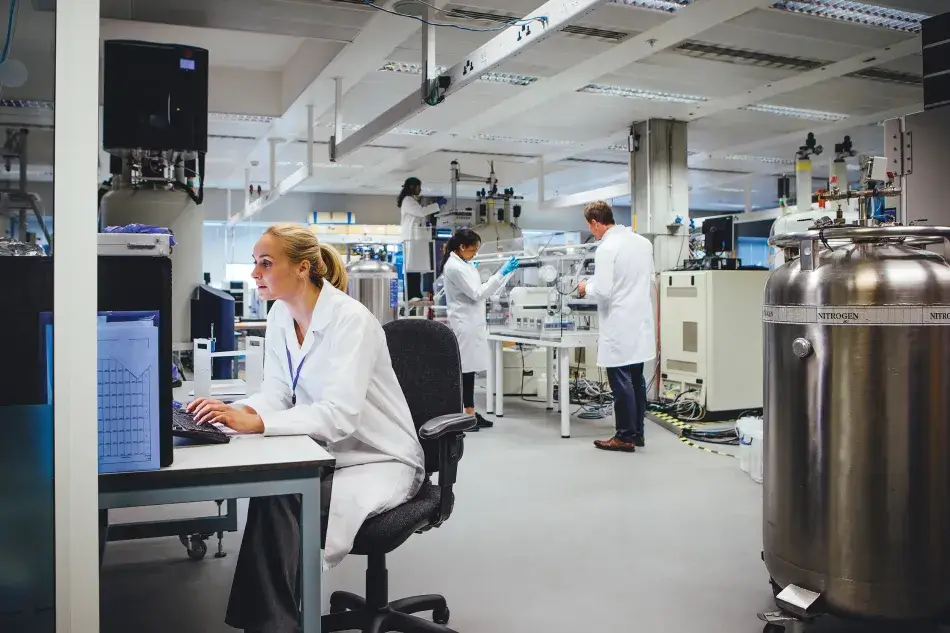
The Academy’s record of distinction in Science, Engineering, and Technology dates to its founding mission “to cultivate every art and science which may tend to advance the interest, honor, dignity, and happiness of a free, independent, and virtuous people.” Rather than generate new scientific research, the role of the Academy has been uniquely interdisciplinary, bridging the social sciences and arts with the physical sciences to support a national understanding, belief, and trust in science and discovery. Perhaps no better example of this can be found than in the mid-1800s when the Academy hosted hotly contested debates about a new scientific theory: the theory of evolution.
Academy projects in Science, Engineering, and Technology seek to strengthen the capacity of science and engineering to improve the human condition. This goal has never been more important for the nation or for the world than it is today. Global challenges increasingly require collaboration across disciplinary, professional, and national boundaries, while rapid advances in information processing and transmission raise new issues for both the management of scientific and technical information and for the ability of individuals and institutions to assimilate and act on new discoveries.
Program Advisory Committee
CHAIRS
Alan Leshner
formerly, American Association for the Advancement of Science
Geraldine L. Richmond
University of Oregon
MEMBERS
Nancy C. Andrews
Duke University School of Medicine
Mary Beckerle
University of Utah
Arthur Bienenstock
Stanford University
Emery Brown
Massachusetts Institute of Technology; Harvard Medical School; Massachusetts General Hospital
Claude Canizares
Massachusetts Institute of Technology
David Clark
Massachusetts Institute of Technology
Wayne Clough
Georgia Institute of Technology; formerly, Smithsonian Institution
Robert Horvitz
Massachusetts Institute of Technology
Leah Jamieson
Purdue University
Cora Marrett
National Science Foundation
James Simons
Simons Foundation
Jeannette Wing
Columbia University
Project
Challenges for International Scientific Partnerships

Challenges for International Scientific Partnerships (CISP) articulates the benefits of international collaboration and recommends solutions to the most pressing challenges associated with the design and operation of international partnerships. This initiative identifies policy recommendations and best practices to mitigate challenges for international science collaborations, including physical facilities, distributed networks, and peer-to-peer partnerships. The project released its first report, America and the International Future of Science, in December 2020.
The Large-Scale Science (LSS) working group approaches international collaborations through the lens of issues particular to large-scale science, not peer-to-peer or small-scale international work. This group has been tasked with exploring how the United States can enhance its role in these partnerships, both in physical facilities (such as CERN) and distributed networks (such as the Human Cell Atlas). This group is focusing on recommendations that will bolster U.S. ability to partake in large-scale collaboration efforts as meaningful and engaged partners. The report from this working group, Bold Ambition: International Large-Scale Science, was published in spring 2021.
The Emerging Science Partners (ESP) working group explores issues particular to U.S. scientific collaborations at all scales with countries seeking to boost their scientific capacity, particularly those with limited resources to do so. This working group frames discussions around how the United States can be a better collaborator in its partnerships with emerging science partner countries and work to increase equity in these collaborations. The report from this working group, Global Connections: Emerging Science Partners, was released in fall 2021.
Project Chairs
Arthur Bienenstock
Stanford University
Peter Michelson
Stanford University
Large-Scale Science
Working Group Chairs
Arthur Bienenstock
Stanford University
Peter Michelson
Stanford University
Emerging Science Partners
Working Group Chairs
Shirley Malcom
American Association for the Advancement of Science
Olufunmilayo Olopade
University of Chicago
Steering Committee
Claude R. Canizares
Massachusetts Institute of Technology
Matthias Hentze
European Molecular Biology Laboratory
John Hildebrand
University of Arizona
Kerri-Ann Jones
formerly, Pew Charitable Trusts
William Lee
Wilmer Cutler Pickering Hale and Dorr
Shirley Malcom
American Association for the Advancement of Science
Cherry Murray
University of Arizona
Venkatesh (“Venky”) Narayanamurti
Harvard University
Olufunmilayo Olopade
University of Chicago
Geraldine Richmond
University of Oregon
Vaughan Turekian
National Academies of Sciences, Engineering, and Medicine
Caroline Wagner
The Ohio State University
Large-Scale Science
Working Group
Arthur Bienenstock, Cochair
Stanford University
Peter Michelson, Cochair
Stanford University
Claude R. Canizares
Massachusetts Institute of Technology
E. William Colglazier
American Association for the Advancement of Science
Inez Fung
University of California, Berkeley
Michael Holland
University of Pittsburgh
Kaye Husbands Fealing
Georgia Institute of Technology
Cherry Murray
University of Arizona
Philip Rubin
Yale University
Gary Sanders
California Institute of Technology
Diane Souvaine
Tufts University
Emerging Science Partners
Working Group
Shirley Malcom, Cochair
American Association for the Advancement of Science
Olufunmilayo Olopade, Cochair
University of Chicago
Bruce Alberts
University of California, San Francisco
Bernard Amadei
University of Colorado Boulder
Arthur Bienenstock, ex officio
Stanford University
Jared Cohon
Carnegie Mellon University
Rita R. Colwell
University of Maryland
James W. Curran
Emory University
Ali Douraghy
Lawrence Berkeley National Laboratory (concluded participation on January 19, 2021)
Nina Dudnik
Seeding Labs
Mohamed Hassan
The World Academy of Sciences
John G. Hildebrand
University of Arizona
Nkem Khumbah
University of Michigan
Peter Michelson, ex officio
Stanford University
Peggy Oti-Boateng
United Nations Educational, Scientific, and Cultural Organization
Jamil Salmi
Diego Portales University
Flavia Schlegel
United Nations Educational, Scientific, and Cultural Organization
Vaughan Turekian
National Academies of Sciences, Engineering, and Medicine
Caroline Wagner
The Ohio State University
Project Staff
Tania Munz
Chief Program Officer
Islam Qasem
John E. Bryson Program Director
Amanda Vernon
Program Officer & Hellman Fellow in Science and Technology Policy
Rebecca Tiernan
Program Associate
Jen Smith
Program Coordinator
Funders
Gordon and Betty Moore Foundation
William and Flora Hewlett Foundation
Alfred P. Sloan Foundation
Project Publications
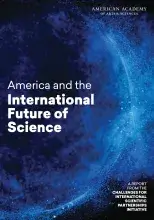
America and the International Future of Science (American Academy of Arts & Sciences, 2020)
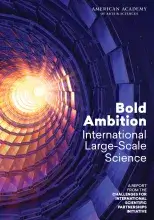
Bold Ambition: International Large-Scale Science (American Academy of Arts & Sciences, 2021)
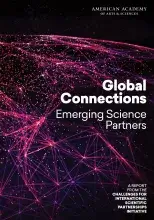
Global Connections: Emerging Science Partners (American Academy of Arts & Sciences, 2021)
Project Meetings & Events
Making the Case for International Scientific Partnerships
December 14, 2020
This event launched the first report of the CISP initiative, America and the International Future of Science. The webinar featured presentations of the report’s findings by the cochairs of the CISP initiative and Large-Scale Science working group, Arthur Bienenstock and Peter Michelson. Their presentations highlighted the report’s recommendations for continued U.S. engagement with the global scientific ecosystem, including U.S.-China collaborations. The event also featured a discussion with the cochairs of the Emerging Science Partners working group, Shirley Malcom and Olufunmilayo Olopade, who discussed the importance of building a more resilient and inclusive scientific enterprise for the post-COVID-19 world, especially through collaborations with emerging science partner countries.
Speakers
Arthur Bienenstock
Stanford University
Peter Michelson
Stanford University
Shirley Malcom
American Association for the Advancement of Science
Olufunmilayo Olopade
University of Chicago
David W. Oxtoby
American Academy of Arts and Sciences
American Association for the Advancement of Science Annual Meeting 2021
Challenges for International Scientific Partnerships: Policy Priorities
February 10, 2021
The CISP initiative hosted a panel session at the virtual AAAS 2021 Annual Meeting. The session included a discussion of international scientific partnerships, across disciplines and at all scales, and identified policy recommendations and best practices to mitigate challenges based on the CISP project’s reports. The session emphasized some of the issues explored by the project’s two working groups: Large-Scale Science and Emerging Science Partners.
Speakers
Arthur Bienenstock
Stanford University
Peter Michelson
Stanford University
Shirley Malcom
American Association for the Advancement of Science
Olufunmilayo Olopade
University of Chicago
CISP Large-Scale Science Impact Workshop
March 29, 2021
Members of the CISP Steering Committee and Large-Scale Science working group met to discuss desired goals and impact for the report, Bold Ambition: International Large-Scale Science. The group identified domestic and international target audiences and proposed strategies for engaging with these audiences as well as outlined a defined strategy for outreach following the publication of the Bold Ambition report.
Meeting Chairs
Arthur Bienenstock
Stanford University
Peter Michelson
Stanford University
United Nations Commission on Science and Technology for Development–Side Event
Challenges for International Scientific Partnerships
May 17, 2021
A side session event at the 24th United Nations Commission on Science and Technology for Development featured presentations on the CISP initiative by project cochairs Arthur Bienenstock and Peter Michelson and a presentation of the goals and findings of the Emerging Science Partners working group by working group cochairs Shirley Malcom and Olufunmilayo Olopade. The event also included a panel discussion that focused on strategies and priorities for building sustainable and equitable international scientific collaborations in Africa. In breakout groups, the meeting participants discussed selected topics in international collaboration in developing regions of the world, including: 1) the Nature of Scientific Collaborations; 2) Capacity-Building; and 3) National Science and Technology Goals.
Speakers
Arthur Bienenstock
Stanford University
Peter Michelson
Stanford University
Shirley Malcom
American Association for the Advancement of Science
Olufunmilayo Olopade
University of Chicago
Panelists
Jonathan Jansen
Stellenbosch University
Jacqueline Kado
Network of African Science Academies
Exploring the Future of International Large-Scale Science
June 1, 2021
The Academy held an online webinar and panel discussion to launch the CISP initiative’s second report, Bold Ambition: International Large-Scale Science. The event featured talks by the project cochairs Arthur Bienenstock and Peter Michelson on the imperatives for U.S. participation in and support for international large-scale science collaborations and initiatives. The program also included a panel discussion, moderated by E. William Colglazier, on the future of large-scale science and how the United States could best participate in such collaborations. The panelists discussed the key role of U.S. federal agencies in funding such initiatives and collaborations; the importance of investing in cutting-edge research in advancing fields such as high-energy physics; and participating in shaping the norms and standards in collaborations in global health and climate change.
Speakers
Arthur Bienenstock
Stanford University
Peter Michelson
Stanford University
David W. Oxtoby
American Academy of Arts and Sciences
Panelists
E. William Colglazier
moderator; Science & Diplomacy, American Association for the Advancement of Science
France Córdova
Science Philanthropy Alliance
James Curran
Emory University
Jonathan Dorfan
formerly, Okinawa Institute of Science and Technology; formerly, Stanford Linear Accelerator Center
Kaye Husbands Fealing
Georgia Institute of Technology
Project
Accelerating Climate Action
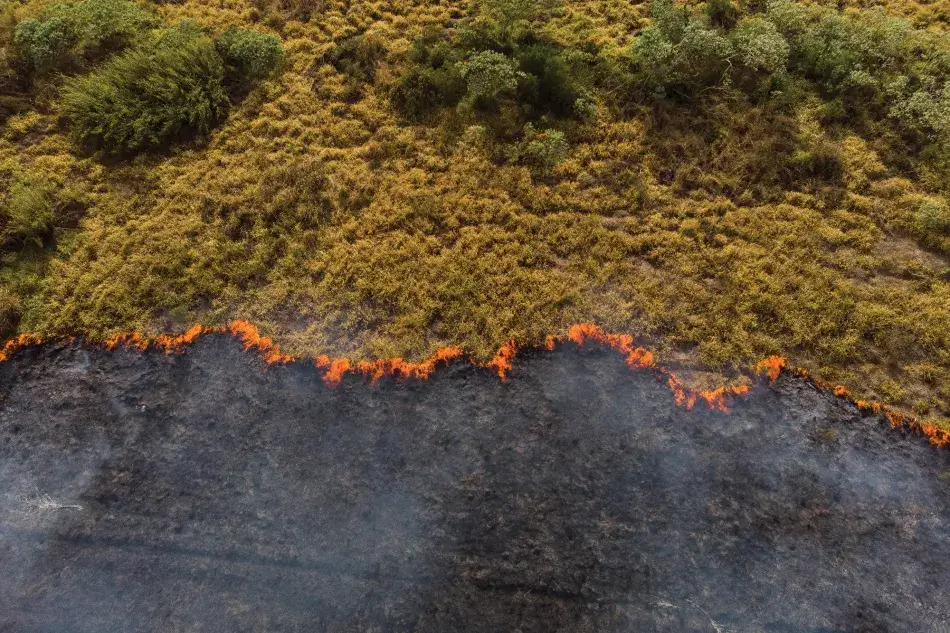
The Academy has launched a new initiative to focus on the global challenge of climate change. The scientific consensus is clear: climate change and its associated devastating impacts are upon us. With such strong scientific backing, what has prevented meaningful action? The project will address two questions: 1) How can the United States accelerate climate mitigation and adaptation strategies for all Americans regardless of race and socioeconomic background? and 2) What policies would most effectively and equitably remove barriers to climate action?
Commission Chairs
Christopher Field
Stanford University
Catherine Coleman Flowers
The Center for Rural Enterprise and Environmental Justice
David G. Victor
University of California, San Diego
Patricia Vincent-Collawn
PNM Resources
Commission Members
Mustafa Santiago Ali
National Wildlife Federation; Revitalization Strategies
Xiye Bastida
Fridays for Future New York City
Philip Bredesen
Former Governor of Tennessee
Patricia Cochran
Alaska Native Science Commission
Mariano-Florentino Cuéllar
Supreme Court of California
Tim Guinee
Climate Actors
Rebecca Henderson
Harvard University
Charles (Chad) O. Holliday, Jr.
Royal Dutch Shell plc
Russel L. Honoré
Commander of Joint Task Force Katrina, Leadership, Safety & Global Preparedness Authority
Bob Inglis
republicEn.org
Leanne Kealoha Fox
University of Hawai‘i at Mānoa
Elizabeth Kolbert
The New Yorker
Gary Roughead
Hoover Institution
Roger Sant
The Summit Foundation; The AES Corporation
J. Marshall Shepherd
University of Georgia
Hilary Tompkins
Hogan Lovells
Elke Weber
Princeton University
Project Staff
Tania Munz
Chief Program Officer
Islam Qasem
John E. Bryson Program Director
Amanda Vernon
Program Officer & Hellman Fellow in Science and Technology Policy
Rebecca Tiernan
Program Associate
Jen Smith
Program Coordinator
Funders
This project is funded through an endowment provided by John E. Bryson and Louise Henry Bryson, a gift from Hansjörg Wyss, and a gift from Roger Sant and Doris Matsui.
Commission Meeting
June 24, 2021
The Commission met for the first time to identify project goals and workstreams. Commission members described the major barriers to action they have seen in their own work and areas of expertise, and they discussed cross-cutting suggestions for areas of focus for the Commission.
Project
Resiliency in Supply Chains
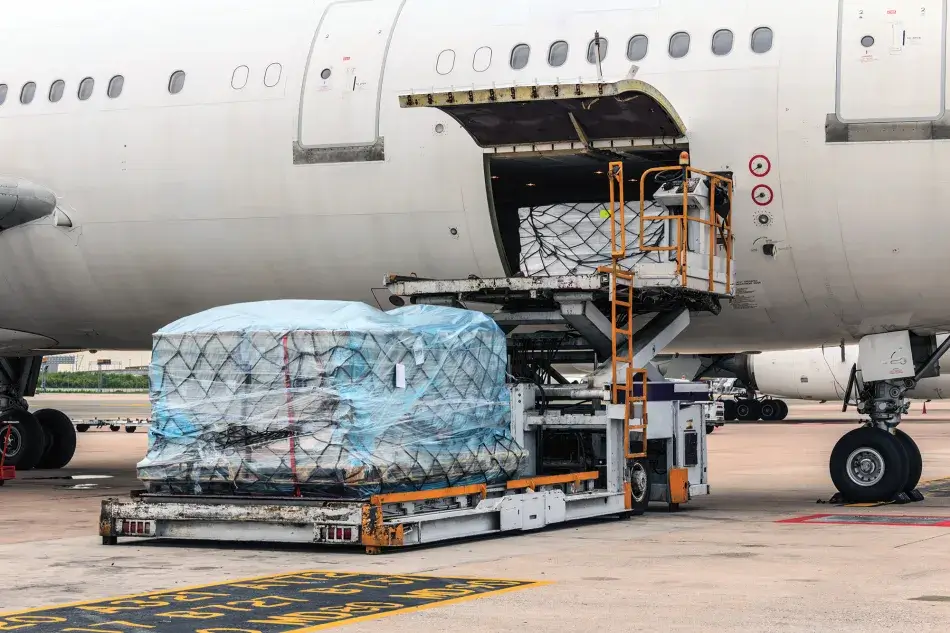
The Academy has launched a new exploratory initiative on building resiliency in supply chains, with a focus on healthcare and food supply chains for a post-COVID world. Supply chains are often invisible, not just to end-users but even to end-suppliers of goods and services. We have seen disruptions in the supply of some of our essential goods, such as medicines, personal protective equipment, and ventilators during the COVID-19 pandemic. In addition to mending the fractures that have been exposed in our current medical supply chain systems, the pandemic has also revealed weaknesses in our country’s food supply networks, in which the human costs of production, distribution, and delivery in unsafe conditions have been disproportionately borne by the most vulnerable participants, now reclassified as “essential workers.”
To address these questions, the Academy will convene an exploratory meeting with a group of interdisciplinary experts who will address the social and ethical dimensions of supply chains and produce useful recommendations for government, industry, and non-profit action. The meeting will explore three themes and identify both the vulnerabilities and challenges as well as possible solutions for each: 1) healthcare and food security supply chains; 2) ethical considerations of supply chains; and 3) national security as it relates to supply chains.
Project chairs
Margaret Levi
Center for Advanced Study in the Behavioral Sciences, Stanford University
Richard Locke
Brown University
Project Staff
Tania Munz
Chief Program Officer
Islam Qasem
John E. Bryson Program Director
Rebecca Tiernan
Program Associate
Jen Smith
Program Coordinator
Funder
American Academy Exploratory Fund
Project
The Public Face of Science
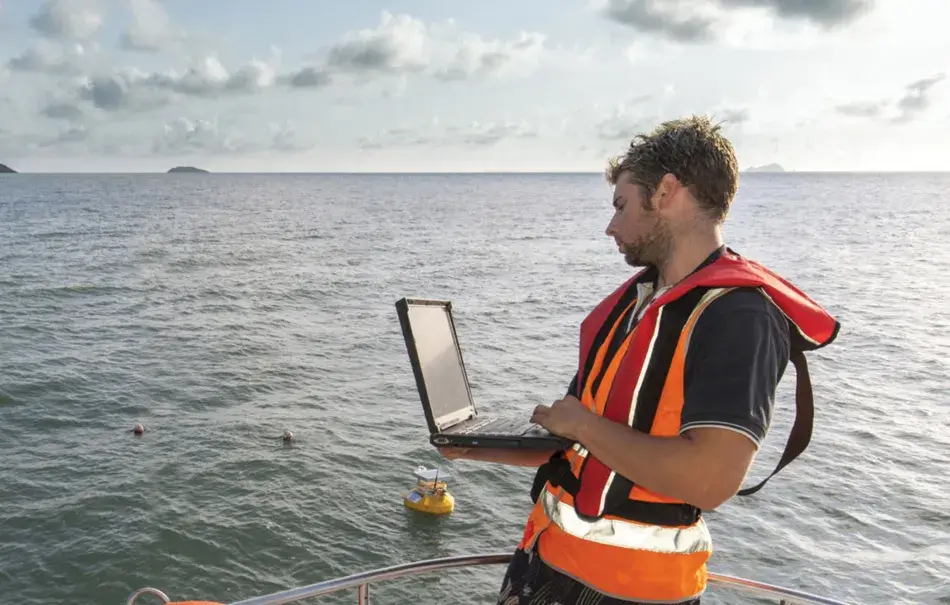
The Academy’s multiyear initiative on the Public Face of Science addresses various aspects of the complex and evolving relationship between scientists and the public and examines how trust in science is shaped by individual experiences, beliefs, and engagement with science. Additional project activities have included published work on the role of science in the legal system and the coordination and deployment of scientific teams as part of crisis response. The initiative has brought together a broad range of experts in communication, law, humanities, the arts, journalism, public affairs, and the physical, social, and life sciences. While this project does not directly address scientific literacy in K-12 and adult education, it will inform such efforts by fostering a greater understanding of the public’s attitudes toward science.
The third and final project report of the initiative, The Public Face of Science in America: Priorities for the Future, was published in August 2020 and presents a series of proposed policy recommendations for target audiences to improve the practice of science communication and engagement. This report was informed by the findings of the earlier publications of the initiative, Perceptions of Science in America and Encountering Science in America, which aggregated data both on how Americans view the role of science in society and how they interact with science in their everyday lives.
Project Chair
Richard Meserve
Covington & Burling LLP; formerly, Carnegie Institution for Science
Steering Group Members
Emilio Bizzi
Massachusetts Institute of Technology
Geoffrey Cowan
University of Southern California
Ellen Futter
American Museum of Natural History
Sylvester James Gates, Jr.
Brown University
Robert Hauser
American Philosophical Society
Rush D. Holt, Jr.
formerly, American Association for the Advancement of Science
Kathleen Hall Jamieson
University of Pennsylvania
Venkatesh Narayanamurti
Harvard University
Nora Newcombe
Temple University
Kenneth Prewitt
Columbia University
Rebecca Rimel
Pew Charitable Trusts
Cristián Samper
Wildlife Conservation Society
Samuel Thier
Harvard Medical School; Massachusetts General Hospital
Project Staff
Islam Qasem
John E. Bryson Program Director
Erica Kimmerling
former Hellman Fellow for Science and Technology Policy
Amanda Vernon
Program Officer & Hellman Fellow in Science and Technology Policy
Rebecca Tiernan
Program Associate
Funders
Gordon and Betty Moore Foundation
Rita Allen Foundation
Alfred P. Sloan Foundation
Project Publications
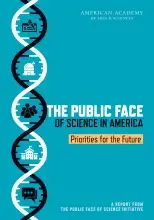
The Public Face of Science in America: Priorities for the Future (American Academy of Arts and Sciences, 2020)
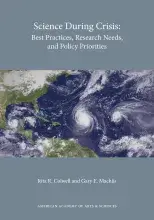
Science During Crisis: Best Practices, Research Needs, and Policy Priorities, Rita R. Colwell and Gary E. Machlis (American Academy of Arts and Sciences, 2019)
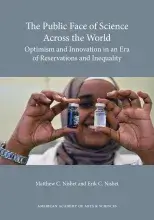
The Public Face of Science Around the World, Matthew C. Nisbet and Erik C. Nisbet (American Academy of Arts and Sciences, 2019)

Encountering Science in America (American Academy of Arts and Sciences, 2019)

Perceptions of Science in America (American Academy of Arts and Sciences, 2018)
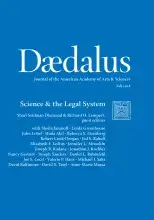
“Science & the Legal System,” Dædalus, edited by Shari Seidman Diamond & Richard O. Lempert (2018)
Project Event
Earning Trust in the Age of the Pandemic
September 16, 2020
The American Academy partnered with the National Academies of Sciences, Engineering, and Medicine to host a conversation on the complex relationship between public trust and vaccines. The discussion explored the public’s multifaceted perception of vaccine safety and the importance of creating and sustaining public trust regarding its use. The discussion accompanied the launch of the project’s final report, The Public Face of Science: Priorities for the Future, which includes recommendations for improved U.S. scientific engagement with the public.
Speakers
David W. Oxtoby
American Academy of Arts and Sciences
Victor Dzau
National Academy of Medicine
Francis S. Collins
National Institute of Health
Evelynn Hammonds
Harvard University
Seth Mnookin
Massachusetts Institute of Technology
Monica Schoch-Spana
Johns Hopkins School of Public Health
Erica Palma Kimmerling
Association of Science and Technology Centers
Project
New Models for U.S. Science and Technology
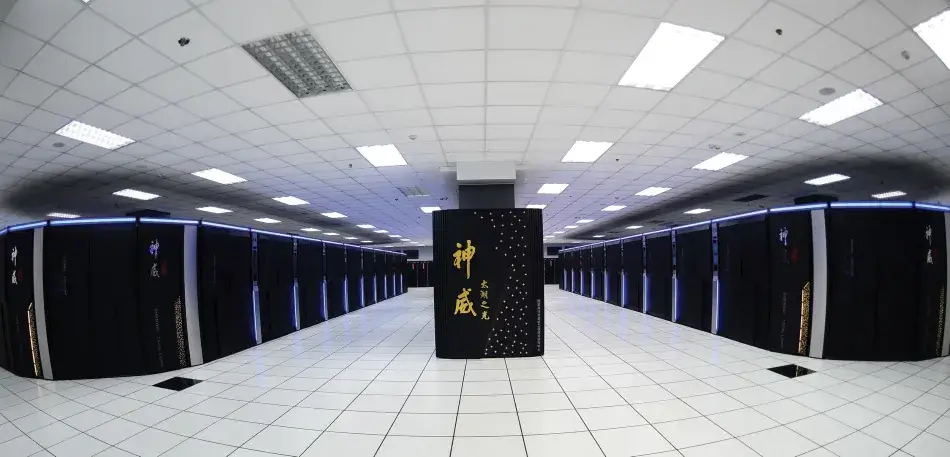
This project assembled recognized leaders from all sectors of science, engineering, and technology to recommend policy actions to help ensure the long-term sustainability of the U.S. science and engineering research enterprise. Scientific and technological advances are fundamental to the prosperity, health, and security of America. Innovation and rapid integration of new knowledge and technologies emerge from investments in research and development and rely on the partnerships between universities, federal and state governments, and industry. Staying globally competitive will require a stronger partnership and a greater focus on long-term planning in scientific and engineering research.
The Restoring the Foundation report, published in 2014, offers actionable recommendations for the long-term sustainability of the U.S. science and engineering research system to ensure a healthy research enterprise that continues to benefit the American people. An update to the report, The Perils of Complacency: America at a Tipping Point in Science & Engineering, published in fall 2020, reaffirms the importance of science and engineering for the United States, especially in the context of China’s rise as a science and technology powerhouse.
Project Chairs
Norman R. Augustine
Lockheed Martin Corporation
Neal Lane
Rice University
Project Members
Nancy C. Andrews
Duke University School of Medicine
John E. Bryson
formerly, U.S. Department of Commerce; formerly, Edison International
Thomas R. Cech
University of Colorado Boulder
Steven Chu
Stanford University; formerly, U.S. Department of Energy
Jared Cohon
Carnegie Mellon University
James J. Duderstadt
University of Michigan
Mark C. Fishman
Harvard University
Sylvester James Gates, Jr.
Brown University
Bart Gordon
K&L Gates; formerly, U.S. House of Representatives
M.R.C. Greenwood
University of Hawaii
John L. Hennessy
Alphabet, Inc.; Stanford University
Charles O. Holliday, Jr.
Royal Dutch Shell plc
Peter S. Kim
Stanford University; formerly, Merck Research Laboratories
Richard A. Meserve
Covington & Burling LLP; formerly, Carnegie Institution for Science
C.D. Mote, Jr.
University of Maryland; formerly, National Academy of Engineering
Venkatesh “Venky” Narayanamurti
Harvard University
Maxine L. Savitz
Honeywell, Inc.
Robert F. Sproull
University of Massachusetts, Amherst; formerly, Oracle Corporation
Subra Suresh
Nanyang Technological University
Shirley M. Tilghman
Princeton University
Jeannette M. Wing
Columbia University
Elias Zerhouni
formerly, Sanofi; formerly, National Institutes of Health; formerly, Johns Hopkins University School of Medicine
Project Staff
Tania Munz
Chief Program Officer
Peter Robinson
Morton L. Mandel Director of Strategic Implementation
Rebecca Tiernan
Program Associate
Amanda Vernon
Program Officer & Hellman Fellow in Science and Technology Policy
Funders
Bryson Science Fund
Hellman Fellows Fund
Project Publications
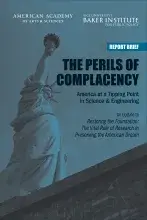
The Perils of Complacency: America at a Tipping Point in Science & Engineering (American Academy of Arts and Sciences and Rice University’s Baker Institute for Public Policy, 2020)

Restoring the Foundation: The Vital Role of Research in Preserving the American Dream (American Academy of Arts and Sciences, 2014)
Project Event
Inadequate Investment: America, China, and the Future of Innovation
September 30, 2020
This virtual event launched The Perils of Complacency: America at a Tipping Point in Science & Engineering, published by the American Academy and The Baker Institute for Public Policy. The report assesses progress and setbacks in the five years since the release of Restoring the Foundation: The Vital Role of Research in Preserving the American Dream. The speakers discussed concerns about America falling behind and policies that could help ensure that the United States secures its strong position of global leadership in discovery and innovation.
Speakers
Nancy C. Andrews, moderator
Duke University School of Medicine
Norman R. Augustine
Lockheed Martin Corporation
Neal Lane
Rice University
Jeannette Wing
Columbia University